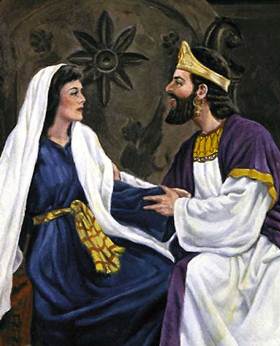Then it happened in the spring, at the time when kings go out to battle, that David sent Joab and his servants with him and all Israel, and they destroyed the sons of Ammon and besieged Rabbah. But David stayed at Jerusalem.
Now when evening came David arose from his bed and walked around on the roof of the king’s house, and from the roof he saw a woman bathing; and the woman was very beautiful in appearance. So David sent and inquired about the woman. And one said, “is this not Bathsheba, the daughter of Eliam, the wife of Uriah the Hittite?” David sent messengers and took her, and when she came to him he lay with her; and when she had purified herself from her uncleanness, she returned to her house. (2 Samuel 11:1-4)
Scholars are divided in their opinions of Bathsheba. The main controversy seems to be over  Bathsheba’s guilt or innocence in her involvement with King David. I am taking the position that Bathsheba had no choice when King David summoned her to the palace. As a vassal and a woman she was not allowed to refuse the king. Some commentators want to cast Bathsheba as a seductress and blame her for David’s sin. But the Bible does not describe Bathsheba that way.
Bathsheba’s guilt or innocence in her involvement with King David. I am taking the position that Bathsheba had no choice when King David summoned her to the palace. As a vassal and a woman she was not allowed to refuse the king. Some commentators want to cast Bathsheba as a seductress and blame her for David’s sin. But the Bible does not describe Bathsheba that way.
Bathsheba was clearly a victim. The Bible gives us the details:
- It was the “spring, at the time when kings go out to battle…” David should have been with his troops but for some reason he stayed home.
- During the evening “David arose from his bed and walked around on the roof of the king’s house, and from the roof he saw a woman bathing;” It was nighttime and Bathsheba was at her own home. She had every reason to expect privacy. It is not clear exactly where her bath was. Some portray her as on the roof of her home. But why would a bathing pool be on a roof? It is more likely that she was in an enclosed courtyard. It was the family’s private space. No one should have been peeping at her.
- David saw “a woman bathing; and the woman was very beautiful in appearance.” David could have looked away and respected Bathsheba’s privacy. Not only did he not turn away, he decided to take steps to get her for himself.
- “So David sent and inquired about the woman.” Even if David had not looked away but indulged his lust by watching Bathsheba, he could have turned and gone back to bed and forgot about the whole thing. Instead he decided to further his sin.
- “David sent messengers and took her,” When David’s men told him that Bathsheba was the wife of Uriah, he would have known that Uriah was away at the battle. He knew that Bathsheba was alone and helpless. Bathsheba could not refuse the king and David knew it. At this point David could still have let the matter drop, but he didn’t.
- When “she came to him he lay with her,” The Bible is clear – David lay with Bathsheba. He is the one who controlled the situation from first to last. Frankly, David sinned against Bathsheba. The Bible makes it clear that she was a victim. Bathsheba soon found that she was pregnant. This was a terrible situation for her. She told King David about her predicament.
David decided to deal with it by getting Uriah home as quickly as possible. David thought that Uriah would naturally sleep with his wife upon returning home. Then the child would be presumed to be Uriah’s.
But Uriah was a dedicated, disciplined soldier and refused the comforts of home while the other soldiers were “staying in temporary shelters, and my lord Joab and the servants of my lord are camping in the open field. Shall I then go to my house to eat and to drink and to lie with my wife? By your life and the life or your soul, I will not do this thing.” (2 Samuel 11:11) David tried several times to get Uriah to go home, but Uriah would not.
David then committed another sin. He had his general Joab put Uriah in the fiercest place of a battle knowing Uriah would be killed. David added murder to adultery.
Bathsheba mourned for her husband when she learned of his death. David had not only offended her physically, but he also caused her to be a widow. Not only that but the laws in Israel were plain – a woman found pregnant out of wedlock was to be put to death. David raped her, made her a widow, and then put her in danger of her life.
 Though David had sinned grievously, he was a “man after God’s own heart.” God sent Nathan the prophet to speak to David. David repented of his sins. When Bathsheba’s time of mourning for her husband was over David sent for her and married her.
Though David had sinned grievously, he was a “man after God’s own heart.” God sent Nathan the prophet to speak to David. David repented of his sins. When Bathsheba’s time of mourning for her husband was over David sent for her and married her.
Sins have consequences even if God has forgiven them. The child that was conceived by this unlawful union died. Bathsheba must have mourned greatly over the death of her first child.
But God is good and He helped David and Bathsheba have a good marriage after this. What could have caused such a transformation from a forced marriage beginning on shaky ground and grief of the death of a child to a marriage of happiness and joy?
First of all, David did repent. God works in the hearts of His children when they are truly sorry for their sins. David had forced a woman and murdered her husband. God was very angry with him. But David’s repentance was real. Nathan the prophet told David that while his sins were forgiven, there would be consequences. Not only did David and Bathsheba’s son die, but God also said, “therefore the sword shall never depart from your house, because you have despised Me and have taken the wife of Uriah the Hittite to be your wife.” (2 Samuel 12:10) (We will see more about the devastating consequences of David’s sin in part 2 of this series on Bathsheba.)
Bathsheba must have forgiven David. The Bible does not tell us much about how the two of them reconciled and truly fell in love and had a wonderful marriage. It must have meant a lot to Bathsheba when David repented publicly. This exonerated her. As a child of God she would have known that repentance and forgiveness are important. As a godly wife it was important to her that her husband be right with God. Bathsheba could love, honor, and obey a man who turned from his sin and did what was right.
David loved Bathsheba until the end of his life. God gave Bathsheba four sons, one of which was the future king, Solomon. (I Chronicles 3:5)
Bathsheba is one of many women in the Scriptures that have been misunderstood or portrayed badly by scholars. Taking time out to read what the Bible actually says about her reveals that Bathsheba was a woman of strong character. She found grace to put her husband’s sins aside and forgive him. She found the strength to forge a good marriage and become one of the foremost mothers in Israel.
Bathsheba’s story reminds us of the kindness of God Who brings good things out of our sinful lives. Yes, there are consequences to our sins, but God moves on after His forgiveness giving us blessings. There is always hope for a better future.

